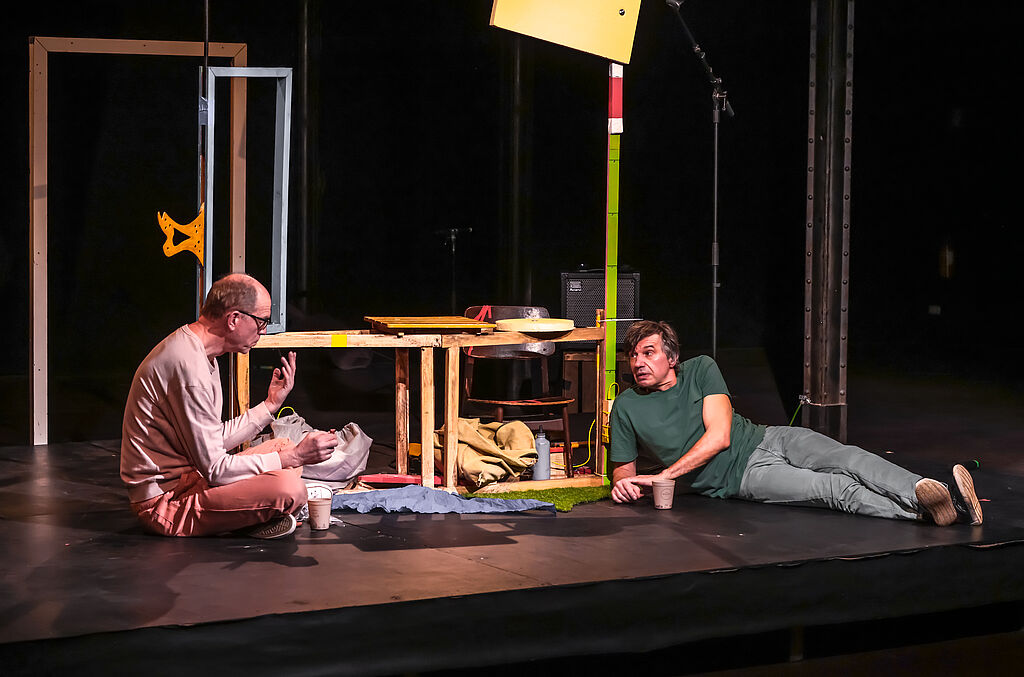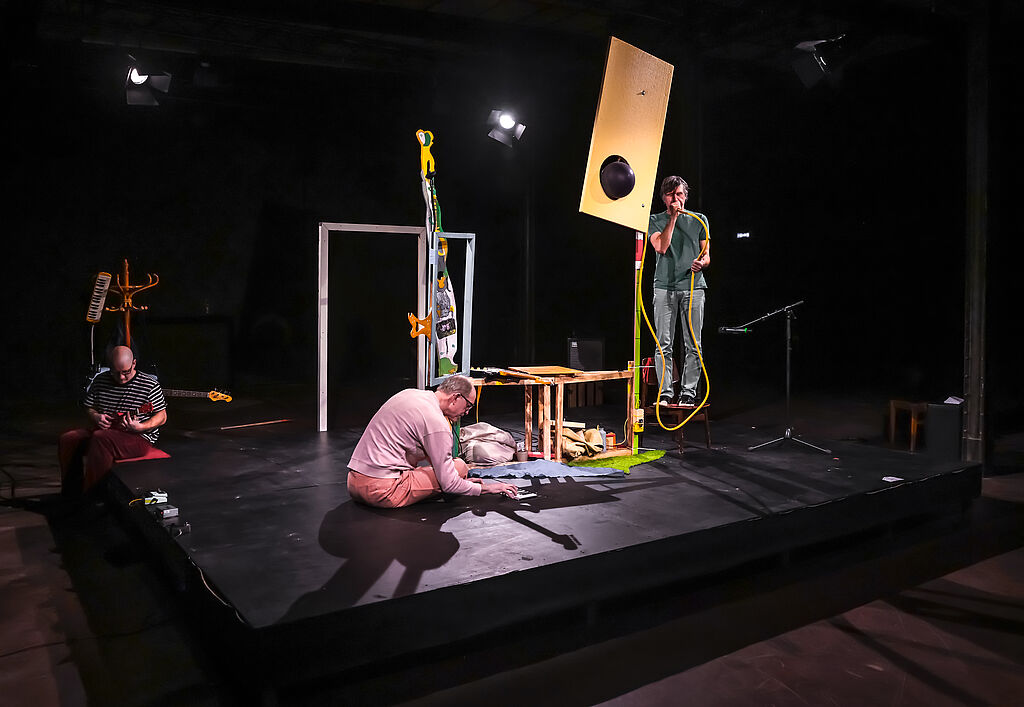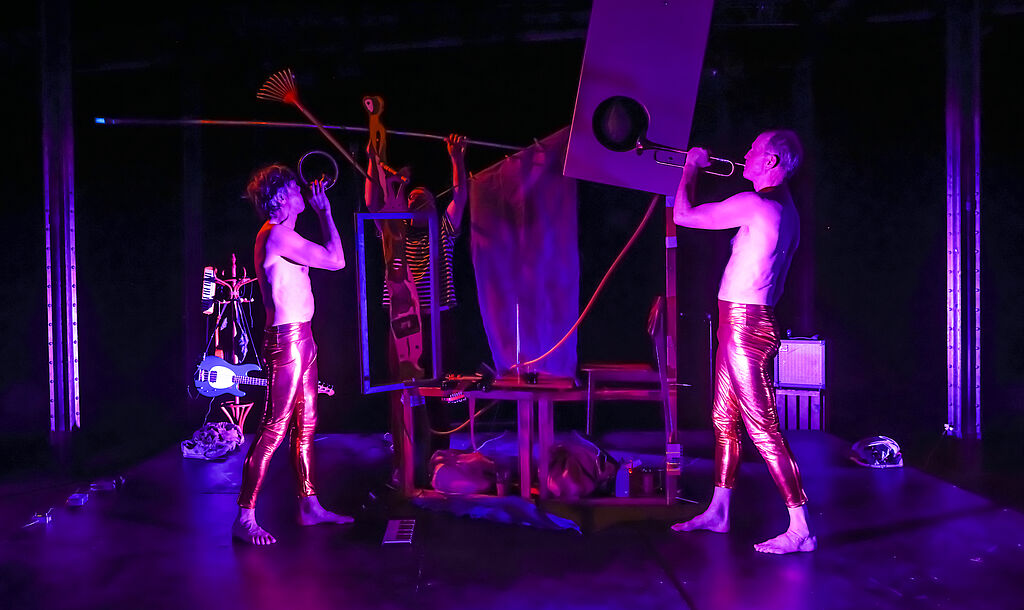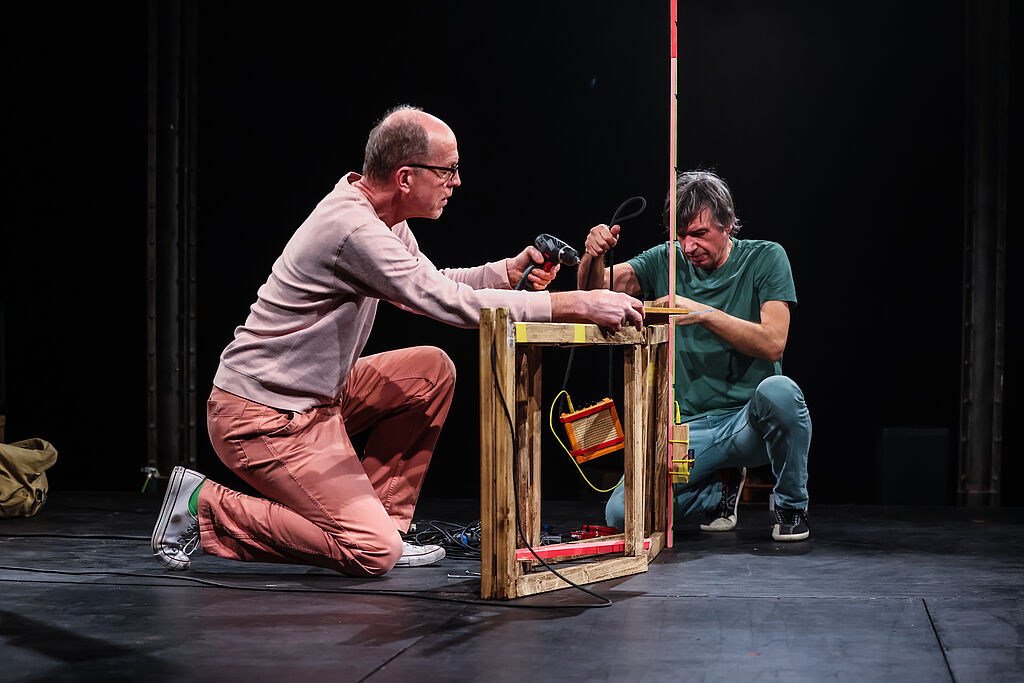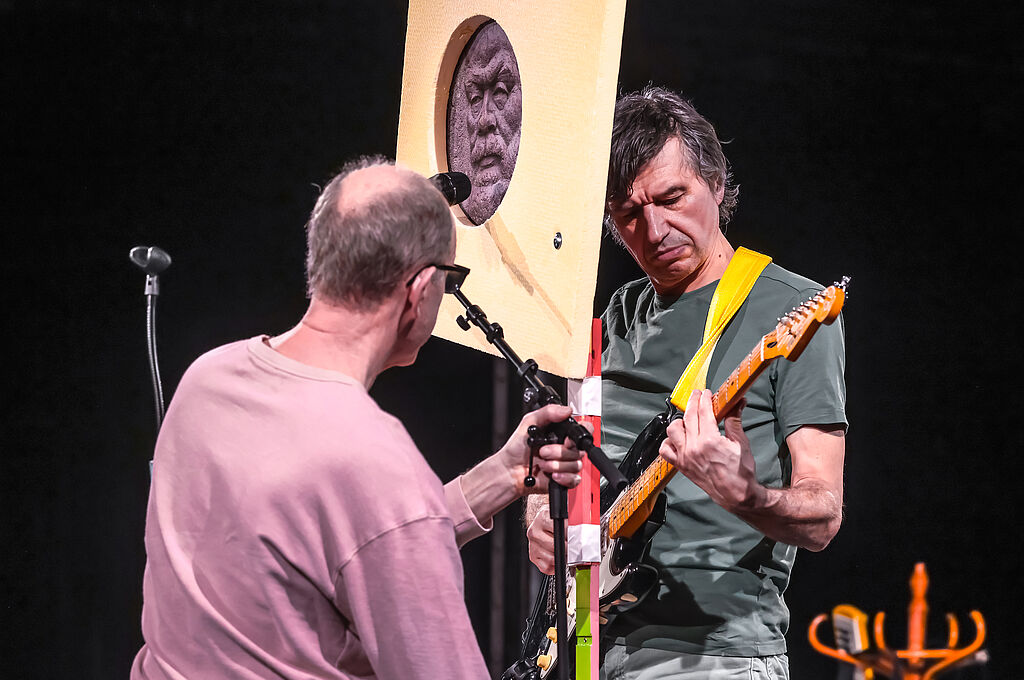
The length of the performance is approximately 70 to 80 minutes.
There will be fog in the performance.
Interview
The stage is home
Two artists, two different cultural backgrounds and two common homes: Frans Poelstra and Oleg Soulimenko have not only found a new home in Vienna, but also on stage. In this interview, the two performance artists explain what it was like for them both to arrive in Vienna and why home is not necessarily a place of escapism.
The stage, which has always been a home that Frans Poelstra and Oleg Soulimenko share with the audience, is now made even more open and accessible. With a mixture of dance, music, soundscape, poetry and work, 69-year-old Frans Poelstra and his colleague Oleg Soulimenko, six years his junior, are building their stage home together and inviting like-minded people to celebrate their achievement. In this interview, the two performance artists explain what it was like for them both to arrive in Vienna and why home is not necessarily a place of escapism.
Frans, you grew up in the Netherlands, Oleg, you grew up in Russia, and now you've both found a new home in Vienna. How were you received in Vienna back then? Did you encounter an open society?
Frans Poelstra: I came to Vienna once in 1989 to perform with Mark Tompkins during the Internationalen Tanzwochen Festival. I remembered it then as a dark and depressing city. When I came to live here in July 2004 it was so different… The city was alive, I immediately had work, two successful premieres in Impulstanz plus, not unimportant, I married in August that same year. I felt very welcomed, was working (and still work) with many local artists and felt recognition from colleagues and audience, received support from MA7 and theaters. I’m almost sure the possibilities and chances I had here (and still have) I would not have had in Amsterdam.
About the society... it will not come as a surprise when I say that Austria feels like a more closed society to me, especially when you come from a country like the Netherlands. It’s maybe a cliche, but still, it’s a comment I receive from a lot of foreigners who live here. I don't know really what it is. It’s like many people have to hold up some kind of image of themselves, for whatever reason. Maybe it is as if one is not good enough and has to pretend to be a “better” self, whatever that “better” self should look like…, I can imagine it creates a lot of stress. And then of course there is also this unresolved past… But, I have wonderful Austrian friends and colleagues, and I feel lucky to have them, so I shouldn’t complain too much!
Oleg Soulimenko: I grew up in a closed country, with little knowledge of how people live and work outside of this huge country. That's why, when the opportunity arose, I was very intrigued to go and see others. Together with a friend of mine I was invited to a workshop and artists' meeting in Italy, luckily Vienna happened to be on the way. We stayed in Vienna for a few days, looked around, got to know the people, the places. And Vienna has invited us to perform here. As far as I remember, at that time the trams were almost empty, people didn't even sit on the empty seats. I also remember huge juicy kebabs and free bananas in the trash at Naschmarkt. The dancers were busy creating there memorable dance gestures. It was open enough that a bit later I was able to perform, teach and work with artists from Vienna, and the artists here were very curious and interested in working with a marginalised artist from the east.
To what extent has the stage become a home for both of you? What does this very public home have that a private retreat does not?
Oleg Soulimenko: At the very beginning of my performance experience, I was interested in crossing the boundaries between private and public, between home, street and stage. Performing on stage and being on stage is like being at home, like being in a supermarket or subway. Then I lost that, becoming interested in working in a quite precisely choreographed direction. In this project with Frans, our stage becomes a home, and somehow our homes become the stage. And I'm trying again to find the ease, the casualness, but also the clarity from my experience of choreographic work. In our “public house” we enjoy sharing enjoyable homy moments with the public.
Frans Poelstra: To me it was first like “the stage is the place, the place to be, to be or not to be.” (those are the lyrics of a song of mine), meaning it was a very special place to be, exciting, challenging, wild, crazy, etc., not at all the feeling of home, it felt more like a stadium where I had to play a game that had to be won (from the audience). I guess that through the years I more and more realised it was not about winning but more about playing. This playfulness is important to me and is often wrongly interpreted as superficial and unserious, and for me nothing could be further from the truth! As a kid I was always playing on the streets with my friends, the street was my home, there life happened, in all its ups and downs. So, now I play and the audience is my friend, I’m home again.
In “The Feeling of Home” you create a vision of a home beyond cozy feelings and private escapism. What can we imagine by that?
Frans Poelstra & Oleg Soulimenko: Do we really do this? Do we create a vision of a home beyond cozy feelings and private escapism? We were of course quite desperate, Corona had hit many of us hard, and in our case we were also worried about our immediate family. We had a place where we could just relax, to hang out, to be oneself. Is that escapism? Isn't it necessary for our well-being to take some distance every now and then? For all of us? To have some time to reflect, to write, to make some music, to tinker a bit with leftovers, or just sit and stare into space? There is no need to produce at home, it can be a place for recovery and where we can receive nourishment for our body and mind. At least that’s how we like to see it, in reality it’s not that simple, we know!
“We are the bones of glory
We are the long-lasting salami
We are today’s and yesterday’s
We always play
We believe in leaves
We believe in dreams
We believe in roots
We are the gentlefruits”
We Are, from Frans and Oleg's song
On stage, you build an obscure figure out of various objects. Where do these objects come from and what meanings do they have for you?
Frans Poelstra & Oleg Soulimenko: The objects were a kind of left overs from our homes, some household items which could have been used to make our homes better, and which we still kept somewhere, but were probably never going to be used. So, they became the beginning of another home, our shared home on stage.
During Corona times, we found an empty studio and brought our leftovers there, along with some toy musical instruments and two (for us) heavy electro-guitars. We missed our roots, so we started making songs about our national cuisine and in the meantime we unconsciously built a sculpture from the leftovers, which eventually became a metaphor for our lives and our (new) homes. At the end of our show we celebrate our beautiful constructed sculpture, which looks quite transparent, so it gives our audience space in their heads to design their own dream house.
“Sweet dreams
Kings with queens
Coffee and cream
We know what it means
Buza-za-za,
Pizza-za- o,
Drikanda,
Brikambo“
I See, from Oleg and Frans's song
About the piece
Für „The Feeling of Home“ erobern sich die zwei weißen alten Männer der Wiener Performance Szene die Bühne für das zurück, was sie für die beiden schon immer war: ihr Zuhause, das sie mit ihrem Publikum teilen. Oleg Soulimenko stammt aus Russland, Frans Poelstra aus den Niederlanden. Beide leben seit vielen Jahren in Österreich. Dieses neue Zuhause aber mussten sie sich erst schaffen, es war ihnen nicht in die Wiege gelegt. Und mit der biographischen Prägung in den verschiedenen politischen Systemen war die Aneignung der neuen Heimat eine sehr unterschiedliche Herausforderung.
Mit einer Mischung aus Tanz, Musik, Sound Scape, Poesie und Arbeit bauen der 69 jährige Frans Poelstra und sein sechs Jahre jüngerer Kollege Oleg Soulimenko gemeinsam ihr Bühnenhaus auf und laden Gleichgesinnte ein, um ihre Errungenschaft zu feiern. Am Ende tauchen unbekannte Gäste auf und geben der House Warming Party eine überraschende Wendung.
Oleg Soulimenko und Frans Poelstra berufen sich nicht auf Philosophen, um „The Feeling of Home“ zu rechtfertigen, und sie haben auch noch nicht das richtige Zitat gefunden, um ihre Leistung zu beschreiben. Sie haben zwar einige interessante Artikel und vielleicht sogar ein Buch gelesen, aber leider alles wieder vergessen. Oleg Soulimenko steht auf obskure LPs aus den 60er und 70er Jahren. Frans Poelstra ist immer noch ziemlich eitel und sehr damit beschäftigt, einen flachen Bauch zu behalten was in seinem Alter nicht so einfach ist.
“Poelstra und Soulimenko zeigen mit ihrem formalen Minimalismus und ihrer Leidenschaft für spontane Improvisation, dass sie vom Avantgarde-Hintergrund der 1960er herkommen. Die aus Holland respektive Russland stammenden Wiener brauchen nicht viel …"
Helmut Ploebst, Der Standard, 16. Juli 2020
Credits
Konzept / Performance / Musik
Oleg Soulimenko, Frans Poelstra
mit Unterstützung von
Oliver Stotz
Eine Koproduktion von Residenz Schauspiel Leipzig mit dem Verein Vienna Magic.
Biographies
Oleg Soulimenko ist ein Künstler, der gerne zu viele verschiedene Dinge tut. Er wuchs in einer großen Stadt auf, in der es nicht erlaubt war, Rock'n Roll zu hören und mit nacktem Oberkörper zu tanzen, aber er tat beides. Er arbeitet in den Bereichen Performancekunst und zeitgenössischer Tanz in Österreich, Europa und den USA.
Frans Poelstra verbrachte als Kind mehr Zeit damit, in die Grachten von Amsterdam zu starren als in die Schule zu gehen. Er träumte davon, der nächste Jimi Hendrix zu werden. In Ermanglung des Talents zum Gitarrenspielen beschloss er, in der Kunst zu arbeiten - dem Bereich, in dem man professionell träumen kann. In seinen Arbeiten mischt er Tanz mit Theater, Musik und bildender Kunst auf eine Weise, die die Menschen zum Nachdenken bringt: "Träume ich, ist das wirklich möglich oder zumindest akzeptabel?" Und wie Soulimenko arbeitet auch Poelstra im Bereich der Performancekunst und des zeitgenössischen Tanzes in Österreich, Europa, aber nicht mehr in den USA.
Oliver Stotz (1971) Musiker, Komponist, Programmierer, Ton- und Videotechnik. Zahlreiche Bands (PENDLER, GUSTAV & BAND, KINKY MUPPET, …), seit 2022 Gitarrenensemble "IN THE HILLS, THE CITIES". Arbeiten im Bereich Musik, Theater und Film u.A. mit Helene Weinzierl, Sabine Marte, Lisa Spalt, Eva Jantschitsch, Jan Machacek, Dieb13, Billy Roisz, Oleg Soulimenko http://oliver@klingt.org
